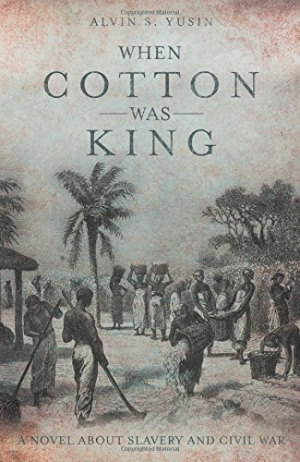When Cotton Was King
A Novel About Slavery and Civil War
Meticulously researched and plotted, the novel threads the Blackstone family seamlessly through the narrative of the Civil War and the preceding conditions.
Alvin S. Yusin’s historical novel When Cotton Was King is a multigenerational family saga that probes one of the deepest stains on America’s morality.
The novel follows the Blackstone clan through the antebellum period and the Civil War, dramatizing major historical events, including John Brown’s Pottawatomie Massacre, the Fugitive Slave Act, the Underground Railroad, and the Kansas-Nebraska Act, which repealed the Missouri Compromise. Taking place on famed battlefields like Bull Run and Gettysburg, the story depicts tragedies both fictional and actual, both personal and national.
Grounded in an august literary tradition of war writing, When Cotton Was King is dedicated to Leo Tolstoy’s War and Peace, and the influence is obvious. It also filters an epic, cataclysmic war of great historical sweep through the perspective of families over several generations, mixing real-life historical characters like General Sherman with wholly invented ones. It elucidates history, for instance showing how the Fugitive Slave Act created the “human carrion” of slave catchers and how people were recruited into such a vile profession.
Meticulously researched and plotted, the novel threads the Blackstone family seamlessly through the narrative of the Civil War and the preceding conditions. Their story unfolds naturally and believably, showing how they inherited barbaric, unforgivable institutions that society finally started to reject.
Patriarch Andrew Blackstone marries into an aristocratic family in his quest for “social dominance.” He and his wife, Rebecca, start freeing slaves, initially out of personal gratitude and a calculated bid to curry favor with northern abolitionists. The intergenerational sweep is so well detailed that there’s a moment of earned pathos when an elderly Andrew Blackstone finally sets down his book and his great-grandchildren frolic in the meadow.
A number of ancillary families get dramatized, such as the Quaker Sandcastles of Pennsylvania, whose ancestor goes on to help found a major medical school. This is a book that brings history to life.
Characters are dimensionally rendered. An aristocratic heiress seeks to free the slave who raised her; slave owners are sometimes shown as conflicted and guilty people. Slaves, like the beneficent Momma Jo with her homespun wisdom, skirt on stereotypes but are generally presented with depth and humanity. They go on to have fully realized lives after surviving the brutal institution, starting furniture companies and fighting with free state regiments.
A detailed knowledge of the subject matter is readily apparent. The book shines a light on everything from the operations of combat hospitals in the South to congressional wrangling and horse trading over seemingly intractable disagreements.
Prose is dignified and formal, with a Victorian flavor. It often reaches for poetic heights: cannon sounds diminish the prayers of the dying; wounded men cry out “as the sun beat down upon them.” Dialogue blends right in. Abolitionists like John Brown are given unique, fiery voices that seem authentic and true to the period.
When Cotton Was King showcases craft, insight, and engaging narration, making the Civil War come alive and shining light on the barbarous institution of slavery.
Reviewed by
Joseph S. Pete
Disclosure: This article is not an endorsement, but a review. The publisher of this book provided free copies of the book and paid a small fee to have their book reviewed by a professional reviewer. Foreword Reviews and Clarion Reviews make no guarantee that the publisher will receive a positive review. Foreword Magazine, Inc. is disclosing this in accordance with the Federal Trade Commission’s 16 CFR, Part 255.

